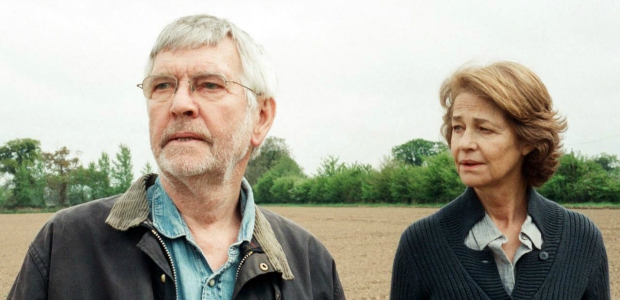45 Years
“The wild places are where we began. When they end, so do we” - David R. Brower, environmentalist
Plot summary
There is just one week until Kate Mercer’s forty-fifth wedding anniversary and the planning for the party is going well. But then a letter arrives for her husband. The body of his first love has been discovered, frozen and preserved in the icy glaciers of the Swiss Alps. By the time the party is upon them, five days later, there may not be a marriage left to celebrate.

Please note: this review contains spoilers.
Life expectancy in the UK is 82 for women and 78 for men. While the exact length of any given mortal coil is uncertain, whichever way you look at it 45 years is the best part of a lifetime. What if you were to sacrifice and dedicate those years, your life, to a partner, only to discover that beneath all your carefully constructed contentment is a tumultuous pit of loss and regret? What if you built your major relationship on a foundation of ice, and it’s melting fast?
Director Andrew Haigh’s third feature film, 45 Years, is a knotty and nuanced interrogation into the disaster of a broken marriage. A contemporary tragedy that quietly surveys the consequence of inauthentic living, it serves as a warning tale for those dabbling in blissful ignorance. The story is at the same time remarkably familiar and wildly harrowing. Taking occasional cues from the detective and horror genres, the (metaphorical) villain in 45 Years is played simultaneously by marital complacency, a shape-shifting body of ice and an ex-girlfriend released from the dead.
Haigh paints beautiful portraits of the human condition. His characters are thoroughly composed, complex and flawed. Refreshingly, the film, which is based on the short story In Another Country by David Constantine, presents audiences with a pair of older lead roles. Septuagenarians Kate (Charlotte Rampling) and Geoff (Tom Courteney) are erudite, political and atheist. They have enjoyed a long, stable and childless marriage in a small, picturesque village in Norfolk. Five days prior to their 45th wedding anniversary, Geoff receives an extraordinary letter from Switzerland, informing him that the body of his first love, Katya, who died while they were on a hiking trip together in the 60s, has been recovered from a receding glacier. As freakishly well-preserved as The Tollund Man, Katya surfaces and wreaks havoc with the demented persistence of a B-movie zombie.
The winter of marital life must suddenly compete with the vibrant memories of youth. In a cosy bedtime scene with Kate, Geoff shares the details of the events that led to Katya’s untimely demise. However, the factors leading to the death of honesty between the married couple remain as foggy as the pathetic fallacy that descends on the central section of the film. It appears there have been warning signals, one being Geoff’s chosen career. He has spent his adult life in the local concrete factory, successfully rising to a management position. Haigh uses concrete as a metaphor for rigidity; an ugly material slathered unhealthily upon the natural world. Like the Swiss glacier, rather than bringing forth life, it leaves behind pallid ashes. The material also figured in Haigh’s 2011 film Weekend, as a destructive heterosexual impulse.
Kate, a former head teacher, is bright-minded yet occupies her time with petty tasks and errands. There’s a guilty decadence to her life, which, full of gossip and shopping, is in want of substance. Now she must wake up and delve into her husband’s psyche. The delayed insight she experiences is catastrophic. Kate wistfully says to Geoff, ‘We never talked about it [Katya’s death] in all the years we’ve known each other. And it’s tainted everything.’ In six days, she digs deeper than she has in the previous 45 years. Kate’s exploration exposes the loft as a less-gory Bluebeard’s chamber; the altitudinal peak of their house, it’s a symbol of Geoff’s highest level of consciousness, and home of his secret shrine to Katya.
Questions open up their relationship, like fractures exposing crevasses. As Geoff retreats into an alcoholic, smoke-hazed depression, the couple spin into crisis. Perhaps Geoff will abandon their elaborate anniversary celebrations for a pilgrimage of the heart into the Swiss mountains. In the crushing final scene, the camera fixes on Kate as she grasps the significance of their choice of wedding song, ‘Smoke Gets in Your Eyes’ by The Platters: “Today my love has gone away, I am without my love … Tears I cannot hide, so I smile and say, when a lovely flame dies, smoke gets in your eyes”.
The comfortable, cloistered world that Kate and Geoff inhabit is an abundant setting for Haigh’s wry, self-aware filmmaking. He cleverly weaves Kate obsessing over her engorged party plans, with Geoff’s chronic struggle with Kierkegaard alongside a rainbow of emotional brutalities ranging from trauma to loneliness to shame. Aware of the luxury of the dilemma, sheltered as it is within a ‘safe’, middle-class community, Haigh interrogates the tragedy of human existence. 45 Years is a reminder that life is fluid. More than 70 per cent of the planet is covered by ocean, and approximately the same percentage of the human body is water. Yet within this abundance of sloshy and mutable wetness, the desire to build concrete internal structures thrives. To divorce from our mercurial nature is to turn away from some of the most treasured forces in the modern world – those of love, respect and longevity. By failing to navigate the currents within themselves, Geoff and Kate’s partnership congeals and slips away.











COMMENTS